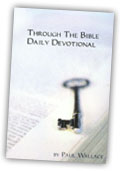9/4
Isaiah 7:14
14Therefore the Lord himself will give you a sign. Behold, the virgin shall conceive and bear a son, and shall call his name Immanuel.
This is one of the most debated passages of the Bible. Since the first century, Christians have quoted it referring to Mary as the virgin and Jesus as "Immanuel," which means "God with us." Matthew 1:23 quotes the verse as being fulfilled at the birth of Jesus. Luke quotes Mary as asking the angel how she can have a child since she is a virgin (Luke 1:34).
The first attack came toward the word "virgin" in the original language in Hebrew. The word could be used of any woman that was of childbearing age. We could argue that the Bible uses the word in the sense of a virgin, but setting that aside, the verse makes no sense if you translate it "young woman." How would it be a sign for a young woman to have a baby? That is not miraculous.
The second attack came from scholars saying Christians take the passage out of context. On closer examination we can see that Isaiah is speaking of two signs. One is that the house of David will continue, and the sign is that the Messiah will be born of a virgin. When addressing the house of David he uses the plural "you" in Hebrew. Isaiah also speaks of a sign to the king that his enemies will be destroyed. It is regarding Isaiah's son, Shear-Jashub, and the age of that son. In that case "you" is singular in Hebrew. In chapter eight verse 18 Isaiah declares plainly that it is his children who are the signs of what is coming, not Immanuel. He also calls the nation Immanuel's land (Isaiah 8:8). Isaiah tells us the Messiah will be a son that is given to us; He will be called Mighty God (Isaiah 9:6). Those who say Matthew took this out of context actually are taking it out of context.
Remember: Matthew was correct and inspired when he quoted this verse. The Virgin Mary of the house of David bore Jesus, "God with us." The Word of God will always be attacked and misinterpreted by those who do not want to bow their knee to its author.








